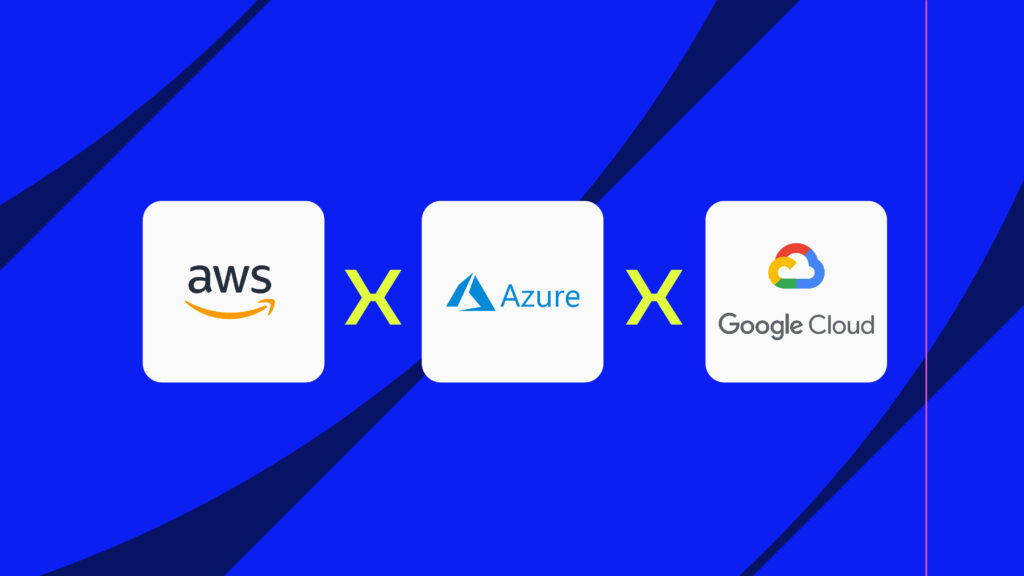With the growing adoption of cloud computing, companies of all sizes are looking to migrate their infrastructure to this technology . According to a study carried out by us, at Skyone , and published by Mordor Intelligence , migration to the cloud among companies is expected to grow 276% by the year 2026.
Among the most popular cloud service options are AWS , Microsoft Azure, and Google Cloud . However, the decision to choose the right platform for your cloud migration can be challenging as each offers a range of unique services, pricing and features.
Therefore, in this article, we will analyze these three main cloud platforms, examining their characteristics, strengths and weaknesses, as well as comparing their essential service offerings, such as computing, storage, data analysis, artificial intelligence and more.
By the end of this text, we hope you have a clear understanding of which cloud provider can best meet your company's specific needs.
Good reading!
Why is migrating to the cloud so important for companies?
Migration to the cloud represents a vital evolution in the IT environment of modern companies. This is because it allows agile adaptation to the current competitive market, where scalability and flexibility of resources are essential.
Furthermore, planning this cloud migration strategy can result in significant savings in operational and maintenance costs, as it is not necessary to have a physical data center
Another advantage is scalability, as companies gain the ability to scale their IT resources according to demand, easily scaling up or down as needed.
Therefore, migrating to the cloud requires meticulous planning , but the risks are known and manageable. Thus, well-structured strategies facilitate a smooth transition process to the cloud.
And the benefits go even further, influencing operational agility and continuous innovation within the corporate environment. A successful cloud migration strategy positions companies on the path to digital transformation , enabling them to be more resilient and future-proof.

What are AWS, Azure and Google Cloud?
When we talk about migrating to the cloud, AWS (Amazon Web Services), Microsoft Azure and Google Cloud are three of the cloud computing providers that offer a wide range of services, including Infrastructure as a Service (IaaS) and Platform solutions. as a Service (PaaS).
Thus, they enable users to create public cloud environments to host applications and manage data in a scalable and secure manner.
History and evolution of each platform
Launched in 2006, AWS pioneered the public cloud market and quickly established itself as a leader . It constantly expands its service offering and global infrastructure, remaining at the forefront of innovation in cloud computing solutions.
Introduced in 2010, Microsoft Azure entered the market with a focus on offering services compatible with many of the solutions already used by companies. It has evolved into a robust hybrid cloud platform , with deep integration of Windows Server and other Microsoft enterprise tools.
Launched in 2011, Google Cloud entered the market with Google's expertise in large-scale data processing and analytics . It stood out in the market for its data analysis capabilities and machine learning services, in addition to offering a highly optimized infrastructure.
In the following sections, discover what each platform offers and what their main features are.
AWS (Amazon Web Services)
As we've seen, Amazon Web Services (AWS) is one of the largest cloud service providers in the world, offering scalability, performance, and a wide range of security tools, making it a reliable choice for businesses of all sizes.
Services offered
AWS offers an extensive list of services, such as Amazon EC2 (Elastic Compute Cloud) for cloud computing, storage services such as Amazon S3 , as well as advanced machine learning and database options. Additionally, AWS optimizes IT infrastructure, offering flexibility and reducing operational costs.
Integrations ecosystem
Systems integration is simplified through AWS's vast ecosystem of integrations (SDKs, CLI, etc.), which allows the connection of different services and applications, from development tools machine learning and analytics solutions .
Performance and scalability
With a robust infrastructure, AWS guarantees high-level performance and scalability . Servers and resources can be quickly adjusted to meet changing demands, making it easy to expand or contract resources as needed.
Security and compliance
Security is a priority at AWS, which has a large number of compliance certifications . It offers advanced security tools to protect data, applications and infrastructure against potential threats.
Support and community
AWS customers have access to technical support and an active community. There are several learning resources and forums where you can exchange knowledge and resolve doubts about AWS services.
Use Cases
Companies use AWS for website hosting , business applications , backups and disaster recovery . The ability to manage large volumes of data and perform complex analyzes with machine learning are just a few examples of the many use cases supported by AWS.
Microsoft Azure
Microsoft Azure is a robust cloud computing platform that offers a wide range of services capable of meeting different cloud migration needs, ensuring security, performance and compliance with varying regulations.
Therefore, planning and good migration strategies are essential to make the most of Azure's potential.
Services offered
Azure offers a variety of services, such as virtual computing, data storage, and big data , that enable companies to build, manage, and deploy applications on a global network managed by Microsoft. These services support various programming languages, tools, and frameworks , both from Microsoft and third parties.
Integrations ecosystem
It provides an integrated ecosystem that allows companies to connect their applications to cloud and on-premises , thereby increasing functionality and flexibility . This includes integrations with identity management systems, databases and Internet of Things (IoT) solutions.
Performance and scalability
Azure also stands out in performance and scalability, allowing applications to adapt to growing demands without the need for preliminary investments in physical infrastructure. The ability to scale services vertically and horizontally makes it easier to manage workloads dynamically.
Security and compliance
The platform ensures a high level of security through multiple layers of defense and advanced compliance features that help protect customer data. It also implements rigorous global compliance standards, including ISO, HIPAA, FedRAMP, and GDPR, reinforcing its commitment to data security.
Support and community
Azure customers have access to comprehensive technical support and a vast community of users and developers . It also provides detailed documentation, tutorials, and discussion forums, which help resolve doubts and promote continuous learning.
Use Cases
Azure use cases are diverse , ranging from small applications to complex enterprise solutions. Companies of all sizes can benefit from using Azure to host their website, develop innovative mobile applications, perform big data , and much more. The flexibility to suit a range of migration strategies is one of its biggest advantages.
Google Cloud
Google Cloud is one of the main cloud computing on the market, offering a variety of public cloud services. They stand out for the integration of tools, performance and security resources when migrating to the cloud.
Services offered
Google Cloud provides varied services including computing, data storage, IoT and Big Data. machine learning tools , allowing companies to optimize their operations with advanced artificial intelligence models.
Integrations ecosystem
The platform integrates with different environments and tools, creating a versatile ecosystem. Through Google Cloud, you can easily connect legacy systems, cloud applications, and IoT devices, providing a unified experience .
Performance and scalability
Scalability is one of Google Cloud's strengths, allowing resources to be adjusted according to demand . With consistently high performance, the platform is suitable for applications that require a large amount of processing or have peak usage.
Security and compliance
When it comes to security, Google Cloud features protected infrastructure and compliance with global standards . It has several layers of security, ensuring data protection and user privacy.
Support and community
It offers a vast portfolio of documentation, tutorials and discussion forums. Google Cloud's developer community and technical support are valuable resources for troubleshooting issues and sharing best practices.
Use Cases
Google Cloud is ideal for companies looking for solutions in machine learning, big data analysis and IoT applications . Whether hosting complex applications or performing advanced data analysis, the platform offers the tools needed for a variety of use cases.
Cloud migration: which provider to choose?
After all, when migrating to the cloud, should I choose AWS , Azure or Google Cloud? The answer is less simple than it seems. When evaluating which cloud computing provider to choose, it is crucial to consider the size and type of workload, the need for cost savings flexibility offered.
AWS is known for its wide range of services and its large global presence , which makes it highly scalable. It is one of the oldest and most established providers, with a robust infrastructure offering storage, networking, and server services.
Thus, AWS has the largest catalog of services, which can be beneficial for companies looking for a wide range of tools and services to meet their complex needs.
On the other hand, Microsoft's Azure stands out for its integration with other Microsoft products , such as Windows Server, Active Directory and SQL Server, which can be a great advantage for companies that already depend on other Microsoft technologies.
Additionally, Azure offers an impressive suite of AI, ML, and analytics services, and is considered the second largest in terms of service offerings after AWS.
Finally, Google Cloud Platform (GCP) is notable for its strong offerings in data analytics, machine learning, and artificial intelligence services . Additionally, it is recognized for its high computing and the infrastructure that underpins popular Google products such as Google search and YouTube.
Given this scenario, companies seeking innovation in AI and ML can find Google Cloud a platform aligned with their needs.
Check out a comparative table below that can help you visualize some differences when migrating to the cloud:
| AWS | Azure | Google Cloud | |
| Release year | 2006 | 2010 | 2011 |
| Market share | Greater market share | Second largest participation | Third largest participation |
| Core services | EC2, S3, RDS, Lambda | Virtual Machines, Blob Storage, Azure SQL Database, Azure Functions | Compute Engine, Cloud Storage, Cloud SQL, Cloud Functions |
| Global presence | 25 regions, 81 availability zones | 60+ regions, 160+ availability zones | 24 regions, 73 availability zones |
| Pricing | Detailed pricing model with multiple optimization options | Competitive pricing and discounts for businesses and Windows users | Competitive pricing with a pay-as-you-go model |
| Storage | S3 for object storage, EBS for block storage | Blob Storage for objects, Azure Files for file storage, Managed Disks for VMs | Cloud Storage for objects, Persistent Disks for block storage |
| Database | RDS for relational databases, DynamoDB for NoSQL | Azure SQL Database, Cosmos DB for NoSQL | Cloud SQL for SQL, Firestore and Bigtable for NoSQL |
| Security | IAM, KMS, GuardDuty, Shield | Active Directory, Key Vault, Security Center | IAM, KMS, Security Command Center |
| collaboration tools | AWS Chime, WorkDocs | Microsoft Teams, Office 365 | Google Workspace (formerly G Suite) |
Count on Skyone to migrate your assets to the cloud
When we talk about migrating to the cloud, in addition to choosing the cloud , being able to count on a partner with expertise is crucial. We, at Skyone , are a specialized company that offers personalized and efficient cloud solutions, aligned with the needs of each client.
It doesn't matter if you choose AWS , Azure or Google: through our unique platform , the migration of your company's assets to the cloud occurs quickly and securely, allowing your IT team to focus on what matters most: your business !
Come find out how we can boost your journey to cloud success!
Conclusion
As we have seen throughout the article, migration to the cloud represents a significant transformation in business processes, encouraging innovation and ensuring greater scalability.
Therefore, choosing the cloud computing service best suited to your company's needs is an important part of the process.
Additionally, it is critical to understand that this transition can involve a variety of environments, including private cloud, hybrid cloud, and other configurations, each serving specific business needs.
Continue your journey of knowledge by checking out our complete guide on migrating to the cloud!





